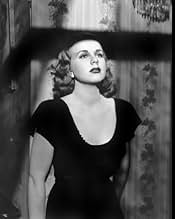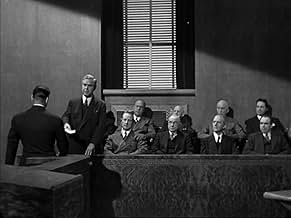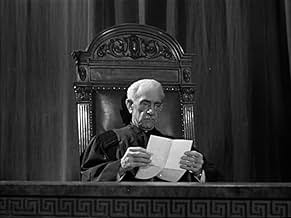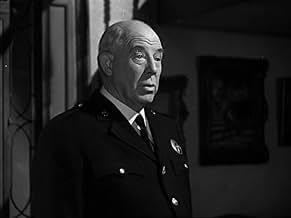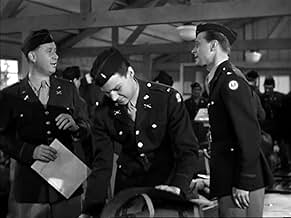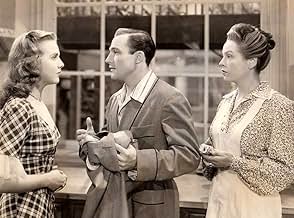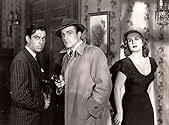IMDb RATING
6.5/10
1.8K
YOUR RATING
A young femme-fatale realizes that the man she married is an incorrigible wastrel.A young femme-fatale realizes that the man she married is an incorrigible wastrel.A young femme-fatale realizes that the man she married is an incorrigible wastrel.
- Director
- Writers
- Stars
- Nominated for 1 Oscar
- 1 nomination total
Eddie Acuff
- Steve
- (uncredited)
Fred Aldrich
- Bartender
- (uncredited)
Frank Austin
- Jury Member
- (uncredited)
John Barton
- Concertgoer
- (uncredited)
Vangie Beilby
- Wedding Guest
- (uncredited)
John Berkes
- Waiter
- (uncredited)
Oliver Blake
- Defense Attorney
- (uncredited)
Charles Cane
- Joe
- (uncredited)
Wheaton Chambers
- Plane Passenger
- (uncredited)
Ruth Cherrington
- Concertgoer
- (uncredited)
James Conaty
- Concert Patron
- (uncredited)
- Director
- Writers
- All cast & crew
- Production, box office & more at IMDbPro
Featured reviews
DEANNA DURBIN begged Universal to let her play a dramatic role after her great success in a string of mostly mediocre films where she played a Little-Miss-Fixit in featherweight romantic comedies who sang operatic ditties with great skill and charm. She was always involved in a scheme to reunite her mother and father for the final clinch.
Here, she handles her very adult role with competence, quite believable as a torch singer in a disreputable nightclub, a troubled woman seeking redemption for problems in her twisted past relationships with a mother and son (GALE SONDERGAARD and GENE KELLY).
Deanna shines in the role, giving it shades of both simplicity and charm while playing the happy bride, but convincing when she becomes the bruised and fragile woman who manages to tell her tale of woe to a young lieutenant. The soldier is nicely played by DEAN HARENS, an officer on Christmas leave who is on his way to San Francisco when a storm forces his plane to land in New Orleans.
The film structure is not always smooth, burdened as it is by a couple of flashbacks in the middle and a rather weak ending that is over too abruptly. But Robert Siodmak and cameraman Woody Bredell give the whole piece a fluid style with long tracking shots and superior cinematography for several key scenes, notably the one that takes place at a church service on Christmas eve, and another in a concert hall.
Durbin's fans will certainly appreciate her rendering of "Spring Will Be A Little Late This Year" and Irving Berlin's haunting ballad "Always." The background music, a mixture of popular songs and classical pieces, is effective, especially for all of the nightclub scenes. Hans J. Salter deservedly won an Oscar nomination for his detailed and meticulous score.
Effective supporting performances from GALE SONDERGAARD, GLADYS GEORGE and RICHARD WHORF strengthen the tale. Well worth watching. Oddly enough, Deanna handles her dramatic chores in much better style than Gene Kelly, who's unable to do much with his role of a weak-willed wastrel who turns to crime for reasons unexplained.
Trivia note: David Bruce has a small role at the beginning. Two years later he'd be co-starring with Deanna in much bigger parts in CAN'T HELP SINGING and LADY ON A TRAIN.
Here, she handles her very adult role with competence, quite believable as a torch singer in a disreputable nightclub, a troubled woman seeking redemption for problems in her twisted past relationships with a mother and son (GALE SONDERGAARD and GENE KELLY).
Deanna shines in the role, giving it shades of both simplicity and charm while playing the happy bride, but convincing when she becomes the bruised and fragile woman who manages to tell her tale of woe to a young lieutenant. The soldier is nicely played by DEAN HARENS, an officer on Christmas leave who is on his way to San Francisco when a storm forces his plane to land in New Orleans.
The film structure is not always smooth, burdened as it is by a couple of flashbacks in the middle and a rather weak ending that is over too abruptly. But Robert Siodmak and cameraman Woody Bredell give the whole piece a fluid style with long tracking shots and superior cinematography for several key scenes, notably the one that takes place at a church service on Christmas eve, and another in a concert hall.
Durbin's fans will certainly appreciate her rendering of "Spring Will Be A Little Late This Year" and Irving Berlin's haunting ballad "Always." The background music, a mixture of popular songs and classical pieces, is effective, especially for all of the nightclub scenes. Hans J. Salter deservedly won an Oscar nomination for his detailed and meticulous score.
Effective supporting performances from GALE SONDERGAARD, GLADYS GEORGE and RICHARD WHORF strengthen the tale. Well worth watching. Oddly enough, Deanna handles her dramatic chores in much better style than Gene Kelly, who's unable to do much with his role of a weak-willed wastrel who turns to crime for reasons unexplained.
Trivia note: David Bruce has a small role at the beginning. Two years later he'd be co-starring with Deanna in much bigger parts in CAN'T HELP SINGING and LADY ON A TRAIN.
A nice film--and it is nice to see Deanna Durbin shed her little girl image for something with a bit of a bite to it. She plays a singer in a nightclub and is married to Gene Kelly, although he doesn't have much to do in this film. Nice to see some good supporting performances by Gladys George and Gale Sondergaard--although Ms. Sondergaard seems a bit young to play Gene Kelly's mother!!
Pairing sunny star Deanna Durbin with stormy director Robert Siodmak is like coupling Snow White with Orson Welles. So who's going to win out—Universal's top money earner or noir's artistic vision. It's a struggle between luminous halos, on one hand, and creepy shadows, on the other. Actually the odd pairing works pretty well, thanks to Durbin's genuine acting ability, Gene Kelly's subtle ambiguity, and an unusually suggestive script. Clearly, Durbin is looking to change her virginal type casting, while Kelly has yet (I believe) to settle into his premier dancing career.
But, it's really Kelly's Manette who steals the film, with both a startlingly sly performance and the script's unconventional suggestions of incest and homosexuality. For example, there's a rather emphatic reference to Manette's being his mother's "all", plus mom's (Sondergaard) consuming attachment throughout the film. There's also repeated reference to Manette's "weakness", just ambiguous enough to go beyond a gambling habit. Couple that with his shaded behavior in several scenes, especially in the "anything goes" gambling den. Needless to say, such forbidden themes could only be hinted at in 40's Hollywood.
Adding to the 40's exotica is Durbin playing what amounts to a barroom hooker. She may remain pure at heart—confirmed in the midnight mass scene—nonetheless, the role amounts to a risky departure for Universal's teen idol. Thus director Siodmak's challenge is to reaffirm Abigail's (Durbin) basic innocence no matter what else happens, which he does through selective cameo lighting, even though that conflicts with his noirish sensibility. Then too, Dean Haren's sweetly normal escort is there to reassure fans that underneath it all, Durbin remains Durbin.
And to think the studio entitled this odd excursion into the dark side, Christmas Holiday, of all things. I sympathize with unsuspecting fans plunking down money to see the usual Durbin fluff. Nevertheless, the movie remains a fascinating study in conflicting styles and ambiguous characterization.
But, it's really Kelly's Manette who steals the film, with both a startlingly sly performance and the script's unconventional suggestions of incest and homosexuality. For example, there's a rather emphatic reference to Manette's being his mother's "all", plus mom's (Sondergaard) consuming attachment throughout the film. There's also repeated reference to Manette's "weakness", just ambiguous enough to go beyond a gambling habit. Couple that with his shaded behavior in several scenes, especially in the "anything goes" gambling den. Needless to say, such forbidden themes could only be hinted at in 40's Hollywood.
Adding to the 40's exotica is Durbin playing what amounts to a barroom hooker. She may remain pure at heart—confirmed in the midnight mass scene—nonetheless, the role amounts to a risky departure for Universal's teen idol. Thus director Siodmak's challenge is to reaffirm Abigail's (Durbin) basic innocence no matter what else happens, which he does through selective cameo lighting, even though that conflicts with his noirish sensibility. Then too, Dean Haren's sweetly normal escort is there to reassure fans that underneath it all, Durbin remains Durbin.
And to think the studio entitled this odd excursion into the dark side, Christmas Holiday, of all things. I sympathize with unsuspecting fans plunking down money to see the usual Durbin fluff. Nevertheless, the movie remains a fascinating study in conflicting styles and ambiguous characterization.
"Christmas Holiday" (Universal, 1944), directed by Robert Siodmak, is an interesting drama with "film noir" elements, (based on the story by W. Somerset Maugham which changes the local from Paris to New Orleans), starring two performers long associated with musical-comedy, Deanna Durbin and Gene Kelly (on loan from MGM), in their only film together. Deanna Durbin's long awaited dramatic role, with two songs thrown in for good measure, might have earned her an Academy Award nomination, but didn't. Due to its lack of television revivals during the last couple of decades, "Christmas Holiday" just remains only a memory to anyone who has any recollection of ever seeing it.
The story begins with Lieutenant Charlie Mason (Dean Harens) about to have Christmas leave from military service to return home and marry his fiancée, Mona, but he receives a letter written by her that reads that she has married someone else. When his plane lands in New Orleans due to a bad rainstorm, Mason, quite depressed, makes the acquaintance with Simon Fenimore (Richard Whorf), a reporter, who invites him to accompany him to a night club managed by Valerie De Merone (Gladys George). While there, Mason meets Jackie Lamont, a night club singer (Deanna Durbin), and after she finishes vocalizing, "Spring Will Be a Little Late This Year," Jackie has Mason accompany her to a church. During the Mass, she starts to break down and cry. Mason covers up by placing his coat over her. He then escorts this troubled girl to a diner where she tells him her story: (Flashbacks reveal Jackie to be Abigail Martin. She meets Robert Manette (Gene Kelly). They fall in love and are soon married. Their marriage is happy and blissful for six months until Abigail learns that her husband, a troubled gambler, has just murdered his bookmaker. Abigail goes through a series of unpleasant circumstances during her husband's trial, especially when Robert's domineering mother (Gale Sondergaard) gives her a hard slap across her face for not having been a stronger influence on him after her son is found guilty and sentenced to serve time in prison.) Forwarding to the present: Abigail finishes her revealing story to Mason. She later learns that Robert has escaped from prison and is out to get her, adding more to her troubles.
When I first saw "Christmas Holiday" in one of its very rare television presentations on a PBS channel in 1982, I was moved by it and Durbin's performance from start to finish, and have never forgotten it. Possibly watching this movie again after so many years, I would not have that same reaction I had the first time, but otherwise, it still brings a new kind of experience in seeing Durbin in a serious role, that shouldn't go unnoticed. Durbin sings two songs, "Spring Will Be a Little Late This Year," and her lovely rendition to Irving Berlin's "Always." I was even surprised to find Gene Kelly playing a role against type. Still new to movies (making his debut in 1942), his dramatic acting comes off somewhat awkward. I've seen Kelly act in other serious roles, some good, some not, but his character in this production is definitely unsympathetic. He even gets a chance to carry a gun and use it in a shoot out. No dancing for him here unless he's dodging bullets bouncing from the floor. As for Gale Sondergaard, she looks too young to be playing Kelly's mother, a role that would have been far better suited to the likes of Margaret Wycherly (best remembered for her gangster mother role in James Cagney's in "White Heat" (1949)), but Sondergaard doesn't disappoint with her domineering performance over her "Momma's boy."
Also seen in the supporting cast is Universal contract player, David Bruce playing Gerald Tyler. Bruce would soon be elevated to Durbin's co-star in her only Technicolor musical, CAN'T HELP SINGING (1944).
Yes,"Christmas Holiday" is a rare find indeed, a different kind of Christmas story, the one that doesn't get to be added in the package of other Christmas movies that air annually on television, including all versions to "A Christmas Carol" (1938), "It's a Wonderful Life" (1946) and/or "Miracle on 34th Street" (1947). While this movie has never been presented on classic cable channels like American Movie Classics, it's currently available (as of 2006) in the VHS format and can be purchased through Movies Unlimited. I recommend seeing it, at least once, if not for its dramatic content, but for its casting. (***)
The story begins with Lieutenant Charlie Mason (Dean Harens) about to have Christmas leave from military service to return home and marry his fiancée, Mona, but he receives a letter written by her that reads that she has married someone else. When his plane lands in New Orleans due to a bad rainstorm, Mason, quite depressed, makes the acquaintance with Simon Fenimore (Richard Whorf), a reporter, who invites him to accompany him to a night club managed by Valerie De Merone (Gladys George). While there, Mason meets Jackie Lamont, a night club singer (Deanna Durbin), and after she finishes vocalizing, "Spring Will Be a Little Late This Year," Jackie has Mason accompany her to a church. During the Mass, she starts to break down and cry. Mason covers up by placing his coat over her. He then escorts this troubled girl to a diner where she tells him her story: (Flashbacks reveal Jackie to be Abigail Martin. She meets Robert Manette (Gene Kelly). They fall in love and are soon married. Their marriage is happy and blissful for six months until Abigail learns that her husband, a troubled gambler, has just murdered his bookmaker. Abigail goes through a series of unpleasant circumstances during her husband's trial, especially when Robert's domineering mother (Gale Sondergaard) gives her a hard slap across her face for not having been a stronger influence on him after her son is found guilty and sentenced to serve time in prison.) Forwarding to the present: Abigail finishes her revealing story to Mason. She later learns that Robert has escaped from prison and is out to get her, adding more to her troubles.
When I first saw "Christmas Holiday" in one of its very rare television presentations on a PBS channel in 1982, I was moved by it and Durbin's performance from start to finish, and have never forgotten it. Possibly watching this movie again after so many years, I would not have that same reaction I had the first time, but otherwise, it still brings a new kind of experience in seeing Durbin in a serious role, that shouldn't go unnoticed. Durbin sings two songs, "Spring Will Be a Little Late This Year," and her lovely rendition to Irving Berlin's "Always." I was even surprised to find Gene Kelly playing a role against type. Still new to movies (making his debut in 1942), his dramatic acting comes off somewhat awkward. I've seen Kelly act in other serious roles, some good, some not, but his character in this production is definitely unsympathetic. He even gets a chance to carry a gun and use it in a shoot out. No dancing for him here unless he's dodging bullets bouncing from the floor. As for Gale Sondergaard, she looks too young to be playing Kelly's mother, a role that would have been far better suited to the likes of Margaret Wycherly (best remembered for her gangster mother role in James Cagney's in "White Heat" (1949)), but Sondergaard doesn't disappoint with her domineering performance over her "Momma's boy."
Also seen in the supporting cast is Universal contract player, David Bruce playing Gerald Tyler. Bruce would soon be elevated to Durbin's co-star in her only Technicolor musical, CAN'T HELP SINGING (1944).
Yes,"Christmas Holiday" is a rare find indeed, a different kind of Christmas story, the one that doesn't get to be added in the package of other Christmas movies that air annually on television, including all versions to "A Christmas Carol" (1938), "It's a Wonderful Life" (1946) and/or "Miracle on 34th Street" (1947). While this movie has never been presented on classic cable channels like American Movie Classics, it's currently available (as of 2006) in the VHS format and can be purchased through Movies Unlimited. I recommend seeing it, at least once, if not for its dramatic content, but for its casting. (***)
The two stars are Deanna Durbin and Gene Kelly so 1940's audiences seeing a title like "Christmas Holiday" may well have expected a musical. The surprise was a TKO, and people reeled under this somewhat cleansed version of the Maugham novel. A powerful drama, "Christmas Holiday" actually proves that Durbin could have been on the verge of a stellar adult career that would have included important dramatic roles. She is merely superb in this one as a 'dance hall singer-hostess' who is determined to suffer as much as her murderous, jailed, asocial husband, very well done here by Gene Kelly. Durbin sings two standards beautifully, but it is her ACTING here that boosts the attention. Robert Siodmak, one of our finest noir-ish directors, carries off this challenge with excellence. Dean Harens is an fine foil for Durbin in her quest for retribution. A Broadway actor, he sounds and acts in the Tom Drake-style, and that is a compliment. Gladys George, Gale Sondergaard, Richard Whorf work well under Siodmak. Perhaps the public wasn't ready for Durbin and Kelly as 'hostess' and 'psycopath', and that is a shame. Despite the whitewash of some of the novel's elements, this is a very very fine film, and Deanna Durbin, wherever you may be these days, you are to be sincerely commended. Thanks for this one!!
Did you know
- TriviaBecause of the Hays Code, screenwriter Herman J. Mankiewicz changed the setting from a Paris brothel to a nightclub in New Orleans, and changed the main character from a prostitute to a more ambiguous nightclub singer and hostess, in adapting the 1939 novel of the same name by W. Somerset Maugham.
- GoofsAfter Robert breaks out of jail, the newspaper spells his last name as "Mannette". However, the correct spelling is "Manette".
- Quotes
Simon Fenimore: [to Charles] The planes are all grounded, the trains won't do you any good, and you're too big for me to carry on piggyback.
- ConnectionsReferenced in Go, Johnny, Go! (1959)
- How long is Christmas Holiday?Powered by Alexa
Details
- Release date
- Country of origin
- Language
- Also known as
- Christmas Holiday
- Filming locations
- St Vibiana RC cathedral, Main St, Los Angeles, California, USA(midnight mass scene)
- Production company
- See more company credits at IMDbPro
- Runtime1 hour 33 minutes
- Color
- Aspect ratio
- 1.37 : 1
Contribute to this page
Suggest an edit or add missing content


